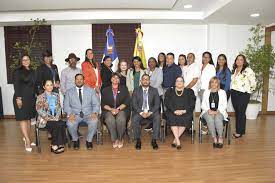At the VII Meeting of the Joint Commission for Technical and Scientific Cooperation, a new Bilateral Program including fourteen initiatives was approved.
The Dominican Republic and Colombia approved a new Bilateral Cooperation Program for the period 2023-2025, which includes fourteen initiatives, making it the largest in the history of negotiations between the two countries.
This program, approved during the VII Meeting of the Joint Commission for Technical and Scientific Cooperation, will promote the development of the following sectors: culture and peace; environment; education; sustainable agriculture; social innovation and entrepreneurship; transparency and inclusion; climate change; human rights; institutional strengthening; labor and social security; territorialization and energy.
This new program is characterized by the affinities of both governments, which place people at the center of their priorities, so that they have real tools for social transformation that allow them to improve their quality of life.
During this stage of cooperation, the Dominican Republic will play the role of provider country in six of the agreed initiatives, while Colombia will assume four demands and four will be two-way.
The Vice Minister of International Cooperation of the Ministry of Economy, Planning and Development, Olaya Dotel, while leading the meeting, pointed out that the new programming begins a new stage of negotiation, characterized by the affinities of two governments that place at the center of their priorities the empowerment of the people, so that they have real tools for social transformation that contribute to improve their quality of life.
Dotel assured that all the projects have the necessary elements to determine their technical and financial viability and are in line with national development plans and the 2030 Agenda for Sustainable Development.
Deputy Minister Dotel pointed out that the Dominican Republic and Colombia have developed important bilateral cooperation initiatives, through which national entities have managed, based on the experiences developed with Colombia, to strengthen their institutional capacities in relevant areas such as institutional strengthening in agriculture, education, among others.
The geographical description that Vice-Minister Dotel made of Colombia, when referring to some of the projects, drew special attention, to which the Colombian delegation reacted with satisfaction; she emphasized that the scope of this program, in addition to the thematic variety, is territorial, extending from the northern coast of Colombia to the south, covering mountainous areas, rivers, basins and valleys of the two nations. He also emphasized that it is a great pleasure for the Dominican Republic that several strengths and successful experiences are recognized by a country like Colombia.
In this regard, both delegations highlighted the atmosphere of fraternity and solidarity in which the negotiations of the cooperation projects and actions were carried out, and ratified their desire to promote the activities contemplated in each one of them.
They also expressed their gratitude for the efforts made to hold this meeting and confirmed their satisfaction with the results obtained and the excellent level of political and technical dialogue achieved.
New Cooperation Program
The programs negotiated include capacity building in institutional governance and processes of pedagogy of historical memory in Colombia’s museum of memory; lessons learned from the Dominican Republic for the construction of sustainable hydro-social territories in Colombia; bilingualism as an instrument for closing social gaps.
Also, capacity building for collaborative work and the construction of networks in arts and culture programs, with the teaching of merengue and bachata; transfer of knowledge for the adoption of sustainable environmental practices in productive agricultural and livestock restitution projects implemented in mountainous areas; culture of entrepreneurship among the population of border territories in Colombia; south-south cooperation for strengthening inclusive public procurement in Colombia, based on the public procurement model; all initiatives based on successful experiences in the Dominican Republic.
VII Joint Commission Meeting
Dominican and Colombian authorities held the VII Meeting of the Joint Commission for Technical and Scientific Cooperation in a hybrid format.
The balance of the 2020-2022 Program was presented by Eleonora Betancur González, general director of the Presidential Agency for International Cooperation of Colombia (ACP-Colombia).
The meeting, held in hybrid format, was also attended by Álvaro Calderón Ponce de León, director of International Cooperation; Luis Armando Soto, director of Cultural Affairs; Darío Villamizar, ambassador-designate of Colombia in the DR; Luis E. Hernández, chargé d’affaires ad.in. of the Colombian embassy in the Dominican Republic, representing the Colombian Ministry of Foreign Affairs.
Also participating from the Dominican Republic were Clara Aquino Smester, Director of Bilateral Cooperation of the Ministry of Economy, Planning and Development; Félix Aracena, Ambassador of the Dominican Republic in Colombia; Giselle Rodríguez, Head of Bilateral Cooperation of the Ministry of Foreign Affairs of the Dominican Republic, representing Deputy Minister Hugo Rivera Fernández; as well as representatives of the executing, offering and receiving institutions of the initiatives, such as, National Social Security Council; Ombudsman; FEDOMU; INFOTEP; INAPA; Ministries of Higher Education, Science and Technology; of Energy and Mines; of Culture; of Finance, MIPyMES; Memorial Museum of the Dominican Resistance, Plan Sierra; SIUBEN; UCE and ISA University.
Source: Mepyd.gob.do
Learn more: NEWS

